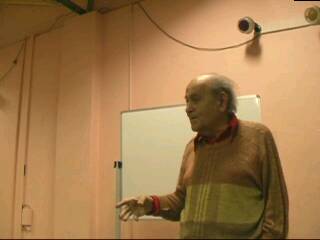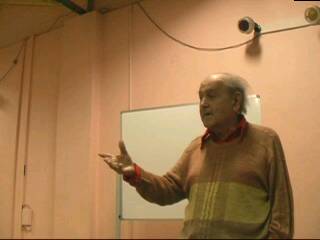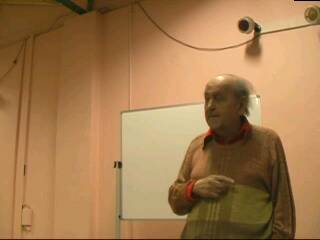


Felix Werder - The illusion of postmodernism
reviewed by John Jenkins
Felix Werder has long been renowned in Australia as a composer at the forefront of the avant-garde, as a teacher and somewhat 'prickly' public intellectual.He says he has never taken an academic approach to music and teaching, and has often challenged mainstream views with more iconoclastic ones of his own, against common wisdom and received opinions.
In a wide-ranging, provocative and amusing address, he returned many times to a recurring thesis. Werder believes that present distinctions to do with 'post-modernism versus modernism' in music, and in culture generally, are based on a very narrow view of aesthetics and history, plus a simplistic acceptance of fashionable definitions, all compounded by specious notions of progress in the arts.
He said that, in a wider view, many examples could be cited of the continuous swinging of a pendulum, or pendulums, in the arts. The first definitions of 'modernism' in music, he says, was cobbled together in the 14th century, and ever since there have been reactions to what had gone before, and re-inventions of earlier movements and positions; with antithesis following thesis, and counter-swings of the same pendulum, down to today. He points, particularly, to a long-standing tension in music between mathematical structure (and abstract and purely formal concerns) and the candid expression of emotional, humanistic and spiritual content.
He says the cycle of 'modern' giving way to 'post-modern' was already apparent in the musical succession from Organum (medieval part writing, after the 9th century) to Orlando di Lasso (1532-94) and Giovanni da Palestrina (1525-94), then to Claudio Monteverdi (1567-1634). "By the 15th century," he says, "when all that had gone before was overturned, we were already post-modern."
Werder then returned to the baleful influence of neo Platonism, and the mistaken idea that there ever could be "an absolute form of the good'' outside of what the age or subject "was able to perceive of it".
Werder also looked briefly at the supposed 'binary' thrust-counter-thrust in music of Salieri-Mozart in the late 18th century; then – and perhaps just to pose a rhetorical question – at the asserted regrettable second-order "descent" of Johannes Brahms (1833-97) from Ludwig van Beethoven (1770-1827). "What," he asks, "had gone wrong?" Put simply, Werder asserts, "the audience had changed – as always", and the game was now in the hands of the bourgeoisie, who are "always impressed by technique", flashy virtuosic display and empty showmanship.
The problem "of the audience" remains, he says, a central and abiding one for all composers. Period. His own stance has been, to put it mildly, oppositional. In his teaching, too, his stance is always that of a devil's advocate for quality and no concessions. Without the right cultural milieu, "and an appreciative audience", he says, "there simply can't be great art or artists".
Werder believes this is entirely the audience's problem, not his own – and he refuses to be satisfied with the situation. Clearly, the audience must change their collective tune, and he has set himself deliberately at odds with prevailing tastes. He says he even gets hate mail for his opinions.
Werder continues to resist demands to be palatable and accessible, to be "pretty and diatonic", to write "pastiche and long, heroic melodies, to write the usual big symphonies – a sort of modern Beethoven that's easier to listen to" – or retract any of the quills bristling on his back. He describes the prevailing cultural, and especially musical, Zeitgeist in Australia as almost uniformly "decadent" and "second rate" – with only a few notable exceptions, at least from among his own generation.
The cultural soil is thin, and in music we have pale and derivative sub-genres..! We are swamped by a Las Vegas culture..! Much more along these lines, too.
Werder studied fine Arts in London, and feels it necessary for creative people to be attentive to art and literature, as well as to music. He believes the best way to compose is to take a 'whole-of-culture' approach. He advises young composers to try to see the great narratives of one's age, on a broader historical canvas. "Immerse yourself in comparative art, learn from the masters of the past, and refuse to compromise,'' might sum it up.
Werder's own father, he tells us, was a writer of liturgical music, and he has paid particular attention, in his compositions, to the setting of texts. In this context, he asserts: "metric setting and metric music, is plainly ridiculous. You must … keep fidelity with speech rhythms and their organic complexity…"
Werder then plays, as an example, a brief excerpt from the Lachrymosa section of his Requiem. The Latin text reads: "We weep for the days of loss…" In Werder's piece, the mood, first of sadness (around the words 'we weep') boldly turns to anger (around 'days of loss'). The entire treatment, including the firm melodic line, remains resolutely anti-diatonic. The 'days of loss' passage incorporates a horn out of tune, to dark and moody effect. There are broken rhythms all the time, and the singers don't sing entire lines so much as a series of text fragments.
Werder points to the necessity of understanding two components of language, when setting texts. The rhythm (and sound pattern), and the content (or meaning). He says they are akin to iconography (the picture) and iconology (the content), respectively, in painting. In a telling aside he says, "I am a frustrated painter. I like tone painting." But one knows this is a thousand miles from program music, and you suspect he is talking here of individual brush strokes, as well as larger structures.
It occurs to me, as Werder finally plays an extract from his Lamentations of Jeremiah – just before he gleefully readies himself to answer what he hopes might be the audience's outraged questions – that the composer is something of a Jeremiah himself, excoriating the throng for their fall to idolatry. Long may this grand old man of Australian music fulminate in the cultural desert, as his text poses a final question: "How empty is a city full of people?" And you can just imagine his blistering reply.
